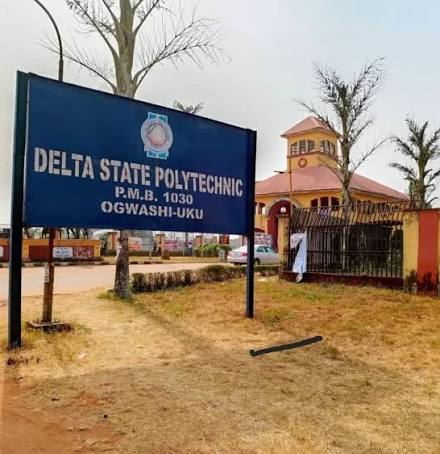Reports emerging from Delta State Polytechnic, Ogwashi-Uku, have sparked outrage among students and stakeholders in the education sector following allegations of a massive result manipulation and extortion scandal within the institution’s Mass Communication Department.
According to several students who spoke on the matter, the department has allegedly been involved in what they describe as a “coordinated result scam,” where final-year results are deliberately withheld to force students into paying exorbitant fees for remedial examinations. The situation, which has thrown the department into tension, is now drawing calls for urgent intervention by the school management and state authorities.
Students Allege Deliberate Withholding of Results
Students of both the National Diploma (ND II) and Higher National Diploma (HND II) programmes in the Mass Communication Department claim that their results have been withheld for months without explanation. They allege that instead of publishing the final semester results on the departmental notice board, as is the normal practice, the Head of Department, Mr. Chuks Nwabudike, has allegedly refused to release them.
According to multiple accounts, this action has created confusion and uncertainty among students—many of whom are anxious about their academic standing and graduation status.
“We have completed all our courses and even defended our projects, yet our results are nowhere to be found. The HOD keeps telling us to pay for remedial exams, even when we are confident that we did not fail,” one student lamented.
Another student, visibly frustrated, alleged that “some scripts that were originally marked and graded by lecturers were later re-marked by the HOD to fail students intentionally.” This claim, if true, points to a disturbing manipulation of academic results for financial gain.
Remedial Exam Fee Controversy Deepens
The crux of the controversy centers on the remedial examination programme, which, according to students, has become a major source of income for the department. The remedial fee is reportedly pegged at ₦23,000 per course, meaning that a student with multiple alleged “carryovers” may have to pay exorbitant sums before being cleared to graduate.
Students argue that this system has turned into a money-making racket where innocent students are deliberately failed to force them into paying for courses they never truly failed. Some described it as an “institutionalized extortion scheme,” saying it has continued unchecked because of fear of victimization.
HOD Denies Allegations, Calls Them Baseless
Reacting to the allegations, the Head of Department, Mr. Chuks Nwabudike, strongly denied any wrongdoing. He described the claims as “false, malicious, and an attempt to tarnish his reputation.”
In his defense, Nwabudike explained that the department’s result processing and remedial programme management are handled through established institutional procedures, not by him personally. He added that he neither has the authority to alter students’ grades nor the power to impose extra payments.
“All results are processed by the examination committee and forwarded to the school’s academic board for approval. The HOD has no power to fail or pass any student at will,” he stated.
Students Demand Investigation and Transparency
Despite the HOD’s denial, tension continues to rise as affected students are calling for a thorough investigation into the alleged result manipulation and extortion scheme. They are urging the Delta State Government, the school management, and relevant education regulatory bodies to step in and conduct a full audit of the Mass Communication Department’s academic processes.
Students insist that such an investigation is the only way to restore trust and ensure that innocent students are not made to suffer financially or academically for issues beyond their control.
“We just want transparency. Let them release our results. If we truly failed, we will accept it, but they should stop playing games with our future,” a final-year student appealed.
Campus Reaction: Fear, Silence, and Uncertainty
Within the campus community, the situation has become a topic of heated debate. While some staff and students express quiet sympathy for the affected students, others are afraid to speak openly for fear of being targeted or sanctioned.
Sources within the institution revealed that this is not the first time students have complained about delayed or withheld results in some departments, but few cases have ever been officially investigated. This pattern, according to observers, reflects a larger problem of poor accountability and lack of transparency in academic administration across some Nigerian polytechnics.
“The problem is systemic,” one lecturer who spoke anonymously explained. “When institutions do not have strong digital result management systems, manual processing allows room for manipulation, delay, and corruption. Students suffer the most.”
Calls for Digital Reform and Oversight
Education analysts and stakeholders are now calling for digital reforms in the way results are processed and published in Nigerian tertiary institutions. They argue that the absence of centralized online result management systems makes it easy for unethical practices to thrive.
Some have suggested that Delta State Polytechnic should implement an automated academic portal where students can check their results directly online, rather than relying on departmental discretion. This, they say, would help eliminate human interference and foster accountability.
Management Yet to Issue Official Statement
As at the time of this report, the management of Delta State Polytechnic, Ogwashi-Uku, has not released an official statement addressing the controversy. Efforts to get a formal response from the Rector’s office were reportedly unsuccessful, fueling further speculation and frustration among students.
Observers believe that an immediate, transparent response from the institution’s leadership could help de-escalate the situation, rebuild student confidence, and prevent future unrest on campus.
Public Reactions and Ongoing Pressure
News of the alleged result scam has continued to circulate widely across student forums, social media platforms, and campus discussion groups. Many Nigerians have expressed outrage, describing the incident as another reflection of corruption in the education system that destroys young people’s futures.
Public commentators are urging the Ministry of Higher Education and the National Board for Technical Education (NBTE) to intervene and ensure justice is served if the allegations are proven true.
Conclusion
The allegations of result manipulation and financial exploitation at Delta State Polytechnic, Ogwashi-Uku, have once again brought to light the critical need for accountability and integrity in Nigeria’s educational institutions.
While the accused Head of Department maintains his innocence, students continue to cry out for fairness and transparency. Until the institution’s management and state authorities conduct a thorough, unbiased investigation, the truth behind these troubling allegations will remain uncertain.
For now, one thing is clear: trust between students and administrators in the Mass Communication Department has been deeply shaken — and only decisive, transparent action can restore it.



